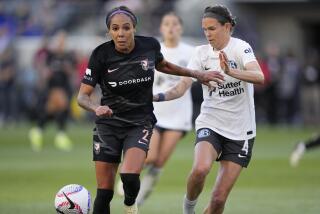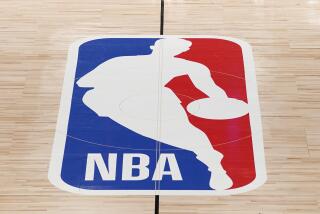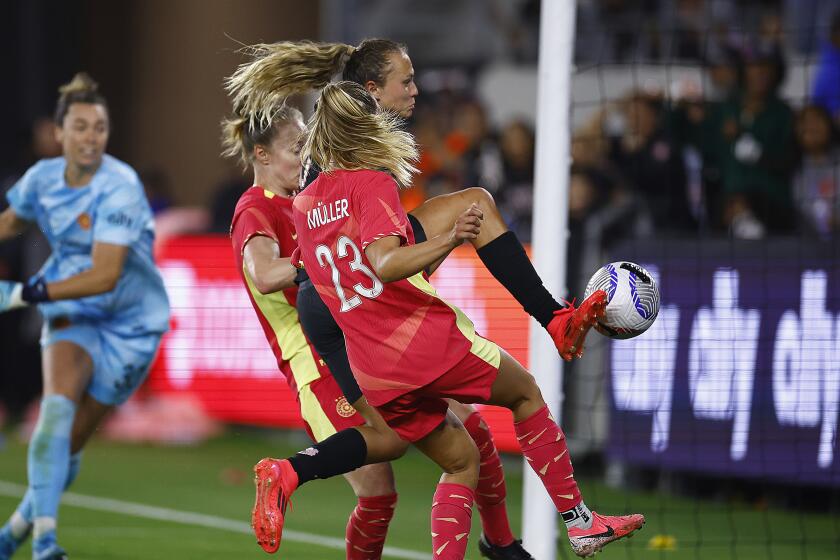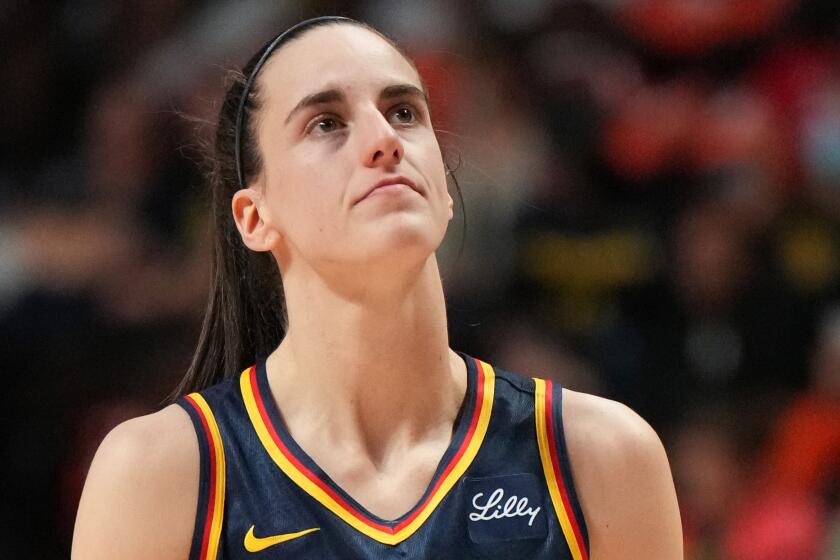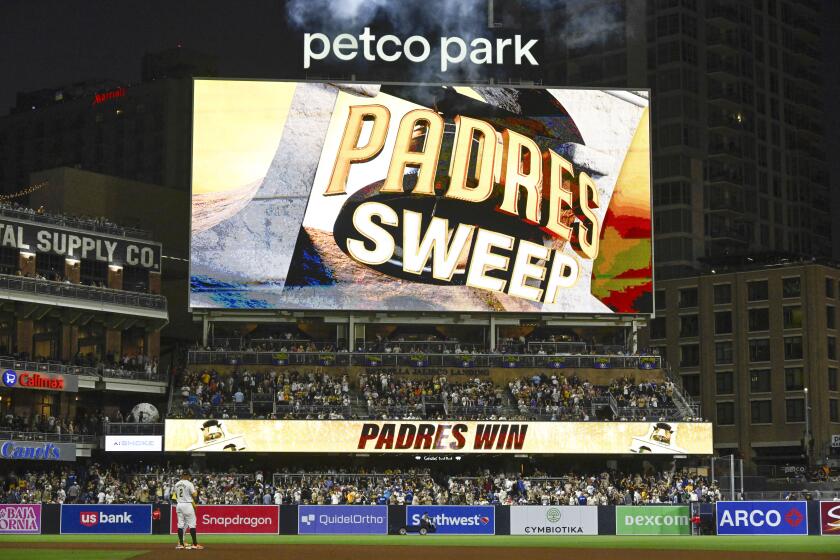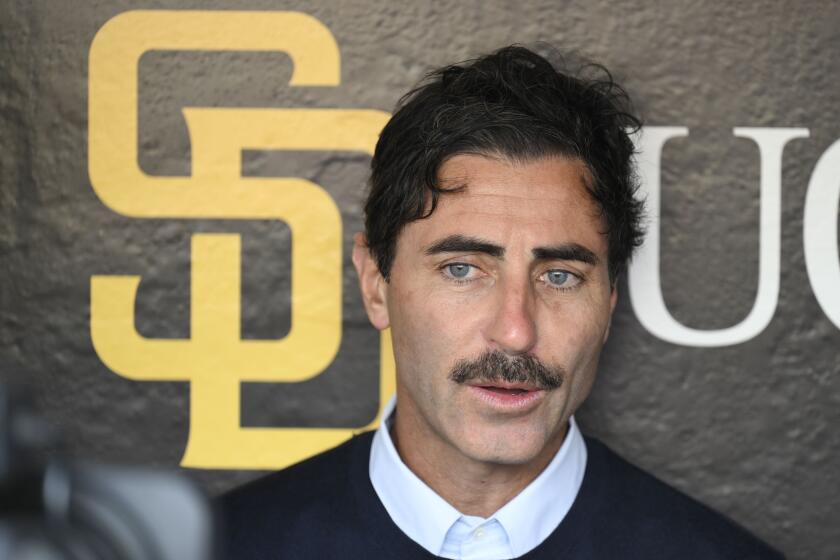National Hockey League locks out players amid labor deal rift
— With little drama and no last-minute negotiations, the National Hockey League locked out its players late Saturday because of deep differences over terms for the new labor agreement the league contends it needs to achieve balance against rising salaries and business costs.
The NHL made no formal announcement after the 8:59 p.m. expiration of the previous collective-bargaining agreement, which was forged at the cost of canceling the 2004-05 season. However, Commissioner Gary Bettman had said he would impose a lockout if the league and the NHL Players’ Assn. didn’t reach a new accord before then.
“We are sorry for where we are,” Deputy Commissioner Bill Daly said Saturday afternoon. “Not what we hoped or expected.”
Training camps are scheduled to open Friday and the first exhibition game to follow two days later. The season is to begin Oct. 11. The Kings are scheduled to raise their much-longed-for Stanley Cup banner on Oct. 12 at Staples Center.
This is the third major professional sports lockout in 18 months. The NFL resolved a 41/2-month dispute in 2011 without losing regular-season games, but the NBA played a shortened schedule last season that began on Christmas Day.
NHL teams can’t make trades or ask players to attend promotional events or workouts during a lockout. Players can’t use team facilities for free and won’t be paid, except those recovering from hockey-related injuries. However, players who are contractually entitled to signing bonuses will receive those bonuses. Players can sign with teams overseas but would have to secure insurance. If they become injured while playing for those teams, they would be subject to suspension by their NHL clubs until they are fit to play.
The league and the union can’t agree on apportioning revenue, which hit a league-record $3.3 billion last season, and how to help small-market teams. The NHL wants to reduce players’ salaries below the 57% share they received last season, and its last offer was for a six-year deal that ended with players getting 47% of hockey-related revenue. The NHLPA is resisting a drop below last season’s $1.8-billion total and proposed tying salaries to league revenue with projected percentages ranging from 54.3% to start to 52% in the fourth year.
Daly and NHLPA special counsel Steve Fehr met for lunch Saturday, but Daly said there had been no movement on substantive issues since larger delegations exchanged proposals Thursday. Those proposals included slight shifts by both sides but weren’t enough to avert the third lockout under Bettman’s watch, following stoppages in 1994 and 2004.
“At this point, we are obviously far apart on so many important issues it’s not possible to bridge any gap before a lockout. It’s a shame,” Daly said.
He said his conversation with Fehr was “nothing new that couldn’t have been talked about last winter.”
Fehr, the brother of NHLPA Executive Director Donald Fehr, said the union wanted to negotiate Saturday.
“Today we suggested that the parties meet in advance of the owners’ self-imposed deadline of midnight tonight,” he said. “Don Fehr, myself and several players on the negotiating committee were in the city and prepared to meet. The NHL said that it saw no purpose in having a formal meeting.
“There have been and continue to be private, informal discussions between representatives of both sides.”
In anticipation of business being suspended, many teams extended players’ contracts and assigned eligible youngsters to the minor or junior leagues to continue playing. The Kings assigned defenseman Slava Voynov to Manchester (N.H.) of the American Hockey League; the Ducks signed defenseman Cam Fowler to a five-year, $20-million extension through 2017-18. “It’s kind of bittersweet to get some good news about you personally” while the fate of the season is uncertain, Fowler said.
An anti-lockout protest outside the NHL’s Manhattan store and office Saturday drew about 25 fans. JhonCarmona of Queens, wearing a New Jersey Devils jersey, wondered why hockey can’t enjoy labor peace like baseball and football do. “I’m really angry they can’t work out an agreement,” he said. “I really want to see hockey again.”
Stephanie Grubler of Trumbull, Conn., brought her 14-year-old son, Noah, to the protest. A month ago she took him and her other son to the Hockey Hall of Fame in Toronto. “You go in to see the Cup, and we’ve been to the Sistine Chapel and it was like that. It’s quiet and reverential,” she said.
“My boys are sucked in. All they talk about is hockey, hockey, hockey. But what are they going to talk about now? I just don’t get why they’re blowing their future, the NHL as a corporation.
“We came to this stupid store three times this year. I’m dropping over $200 a visit because my kids like it so much. Now, I don’t have to come anymore.”
twitter.com/helenenothelen
More to Read
Go beyond the scoreboard
Get the latest on L.A.'s teams in the daily Sports Report newsletter.
You may occasionally receive promotional content from the Los Angeles Times.
